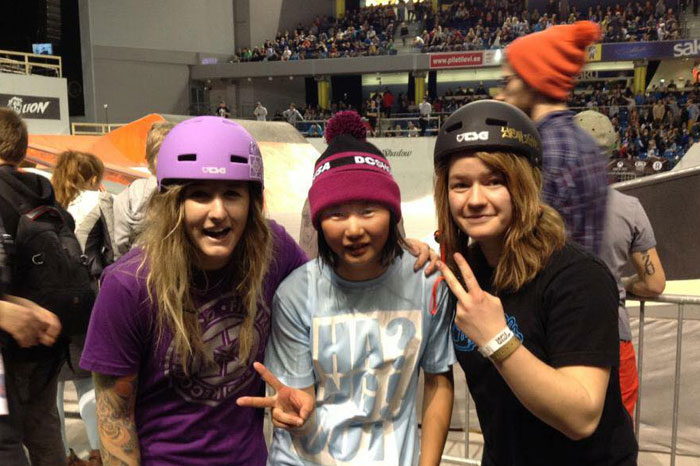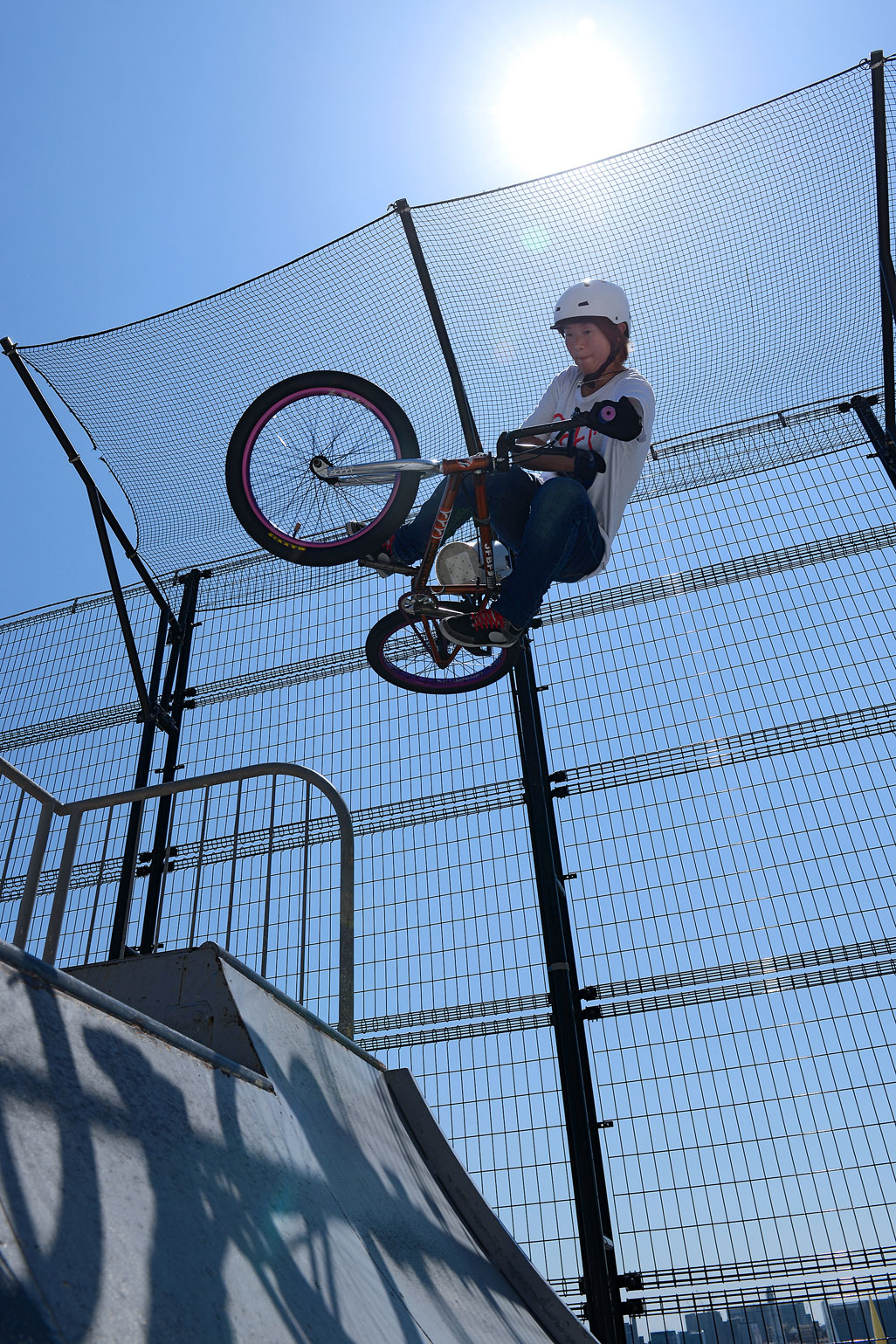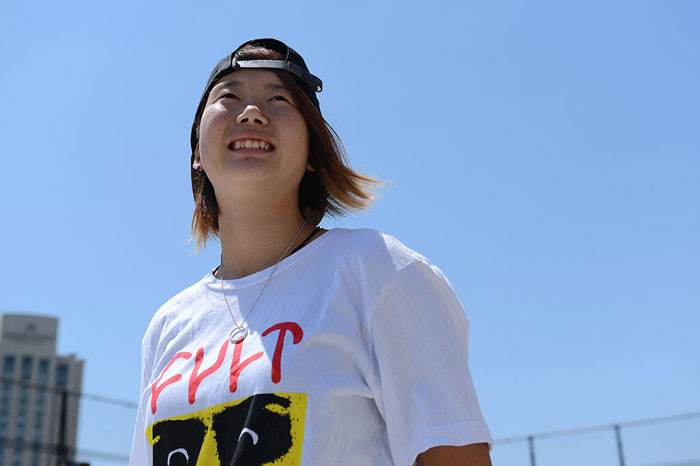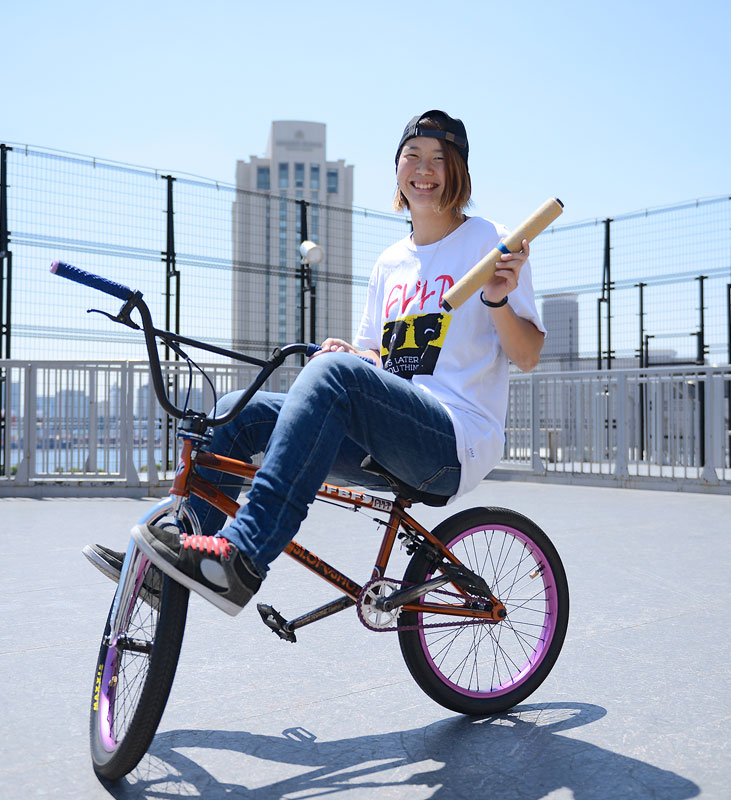

© Yuki Saito

Unlike other sport in general, BMX has a unique culture that is shared around the world. Riding and watching a BMX bike is really fun. Everyone enjoys it, whether they are my peers or are experienced riders. Even if we don’t speak the same language, we can communicate and understand each other by using the joy of riding BMX bikes as the lingua franca. That’s what the BMX culture is about. I think that a sense of enjoying riding BMX bikes and having fun playing is the most important thing.
Ever since BMX freestyle park officially became an Olympic event in 2017, the world of freestyle has been facing many changes. Some incorporate scientific training for BMX freestyle as an Olympic event, and others sometimes refer to riders as athletes. I would like to see the BMX culture that is shared around the world live on, including BMX freestyle as a fashionable sport. We should shape how the sport will be for BMX freestyle going forward. My honest feeling right now is that I don’t want to see BMX freestyle turn into only a sport competition.
There are many things that I feel conflicted about, like not wanting to lose the playful and fun aspects of BMX freestyle. At the same time, I feel responsibility as a member of “Team Japan” and a sense of mission to pave a way for future female riders who will come after me. But, even so, I want to make sure that when I ride my BMX bike, I don’t ever forget the underlying desire to give all to to playing and enjoying myself on my bike.
Ever since I was a child, I thought that it was best to enjoy myself while doing anything, whether BMX or schoolwork. Many people tell me that things might be hard for me now that I’m aiming to be participating in the Olympics, but they want me to make sure that I enjoy myself and stay true to my way of doing things.
So, what’s my way of doing things? It’s to steadily fulfil my mission and responsibilities but only after first giving all to playing and enjoying myself. That is an important way of doing things that I learned through BMX.


© Minato Oike
In 2017, I quit my job, pulled up stakes and moved to the US to participate in the X Games and other major competitions there. To be completely honest, I was filled with anxiety, but since participation was by invitation only, I felt that if I didn’t try this at that moment, there was no guarantee that another opportunity would come up. While it would be taking a risk, there was no question about taking on the challenge if the opportunity was there, so seize the moment.
Taking on challenges is very scary, but there is so much to gain if you overcome your fears. I get very nervous before a competition, and if I’m attempting a new trick, I sometimes feel like I’m going to be crushed by the feeling of fear of failure. At times like that, I first try to envision myself doing that trick. If, in my mind, I don’t see myself succeeding, I switch to a different trick. On the other hand, if I can see myself succeeding, I muster up my courage and try it. At times like that, I really do succeed in soaring through the air just as I saw in my mind.
Imagining success in advance – what triggered this was seeing a pilot who did aerobatic flying at an air show when I was a child. I was in awe of the pilot at the time, and I was watching him closely on the ground, even before he got in his plane and took off. I saw him moving his hands and arms as if he was holding a joystick. I do the same thing now before I do a run, and now I see that this was what he was doing at the time – envisioning himself up in the air and doing the stunts. I see myself of today reflected in this childhood memory.

© Yuki Saito
A BMX freestyle rider basically has neither coach nor manager. Riders pretty much set up their own training menu. They might warm up with a basic riding menu, then repeatedly do the tricks that they want to practise. If I get stuck, I often do something other than BMX. My way of doing things is to I forget about practicing for a while and do something that I like for a change of pace.
After BMX freestyle park became an Olympic event for the Tokyo 2020 Games, a Japan national team – composed of a coach, medical staff, and mechanics – was formed. This is something very progressive, even when compared to other countries. I don’t think that there is any other country with a system of the same extent as Japan in place for BMX freestyle park. I’m grateful that I can get advice and bike-maintenance support. But, the thing is, BMX is ultimately an individual sport. That’s why my stance is that while I am willing to take advice from the coach or others on the national team, I am going to stick to my conviction if their advice goes against something that I believe in strongly.
With that said, it is exciting to find myself representing Japan as a member of the national team. We put on the same training wear and go on training camps. At the World Cup that I participated in representing Japan, I found myself waving the national flag and cheering for our team. Although I was not very conscious of it before then, I realized that I was able to take part in the World Cup because I was in fact representing Japan, being cheered on by the Japanese people and had gone on a training camp with the team. I am recognising myself that the sense of recognition myself as the Japanese representative is growing in me.
Something that I have been trying to do since becoming a member of the Japan national team is to be careful of how I talk. I think it is okay to stay the way that I am when riding – like making a big noise when I am having fun or whooping it up. But, outside of riding, in my regular life or when I am in public, it is important that I speak politely, properly and calmly. I think you need to behave differently according to the situation. It’s not easy to switch between the two and clearly act one way or the other under different circumstances. What I need to do is to keep what is great about the BMX culture while acquiring what is needed as a member of national team. It might be difficult to balance the two different ways of being. Maybe it is one of the struggles that I have to go through as I try to enjoy myself freely while fulfilling my responsibility as a member of Team Japan.


© Yuki Saito
When BMX freestyle park became an Olympic event from the Tokyo 2020 Games, winning a gold medal felt to me like a dream at the time – something that would be far from achievable for me. But after winning my first FISE World Series in May 2018 in Montpellier, France, what had been a dream before then became a concrete goal. I think that winning a gold medal will start to feel even more attainable once I draw my roadmap to that goal.
Going forward, I also want to help raise the next generation of female riders younger than me. As someone with an earlier start, the senior senpai in Japanese, I feel that it is my mission to lead and nurture them into riders who are better than me.
For example, how can you overcome your fear? Honestly, fear is something that always accompanies BMX riding. The fear often takes you into an extreme mental state that you would never experience in every-day life. I personally find it very tough to fight that fear, so I want to offer younger female riders advice based on my personal experience. I want to help them figure out how to overcome the fear in a way that suits them best. When younger riders grow up and aim to compete overseas, I want to utilise the network that I have developed and give them access to it. I want to utilise my overseas experience for them.
I was greatly influenced by my senpai, and there was much that I learned from them. Toshio Takagi, who is also a member of the Japan national team, is someone whom I have admired since I was a child. He is a very trustworthy, big-brother-like presence to us. He leads us on cheerfully, observes each of us very closely and gives us advice from many different perspectives. I think it’s my turn to pass down what I learned from him to riders younger than me.
Junior-age female riders in Japan are all very talented, and there are some who are already attracting attention from abroad. I don’t have any female Japanese riders to compete against right now, so I look forward to seeing younger female riders develop and come after me. It would be really stimulating!


© Yuki Saito
I still believe that having fun is the most important thing, whatever you do. Whether it is a sport or a job, things get boring if you don’t have fun doing it and turn into something you don’t want to do. That is why my first priority is to have fun. I believe that the reason why I was able to keep at BMX freestyle and get to where I am today was because I have fun while riding!
I started BMX freestyle because I like the BMX culture. It never occurred to me that it might one day become an Olympic sport. But, now that it is, perhaps we will be asked to change and behave as an athlete as well as a BMX rider. I like BMX as a culture and as a fashion. I don’t want to change that as what underlies my riding. At the same time, I also want to be steadfast and proper when it is needed. I have these two somewhat conflicting desires, so I am struggling a bit.
I want to seize the opportunity that has been presented to me right now and expand the possibilities beyond enjoyment for both myself and BMX. who can lead female BMX freestyle park riders.
Above all, I want to be someone that children who ride BMX bikes admire and be their role model. I want to let them know that even when circumstances are difficult, we can look for ways to enjoy them. I would like small children to see me enjoying both BMX and my life, and I want them to learn from me. My dream is that by being unwavering in my way of doing things – of being full of vitality and trying things while enjoying them – I will become someone that others admire, not just for her BMX freestyle riding but also for her lifestyle and as a person.


Enjoyed motorcycle motocross and mountain bike trials since childhood. Converted to BMX Freestyle Park while in her early teens. Quit her job in the summer of 2017 and went to the US alone to compete in the X Games and other world competitions.
Won her first UCI BMX Freestyle World Cup in May 2018 in Montpellier, France. Aiming to win the gold medal at Tokyo 2020. Japan’s first professional female BMX rider.